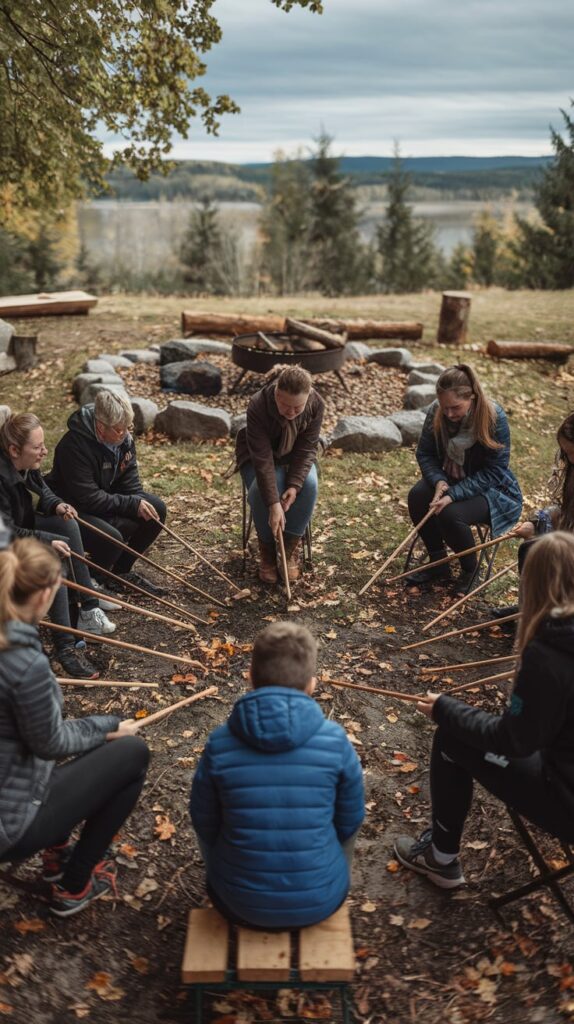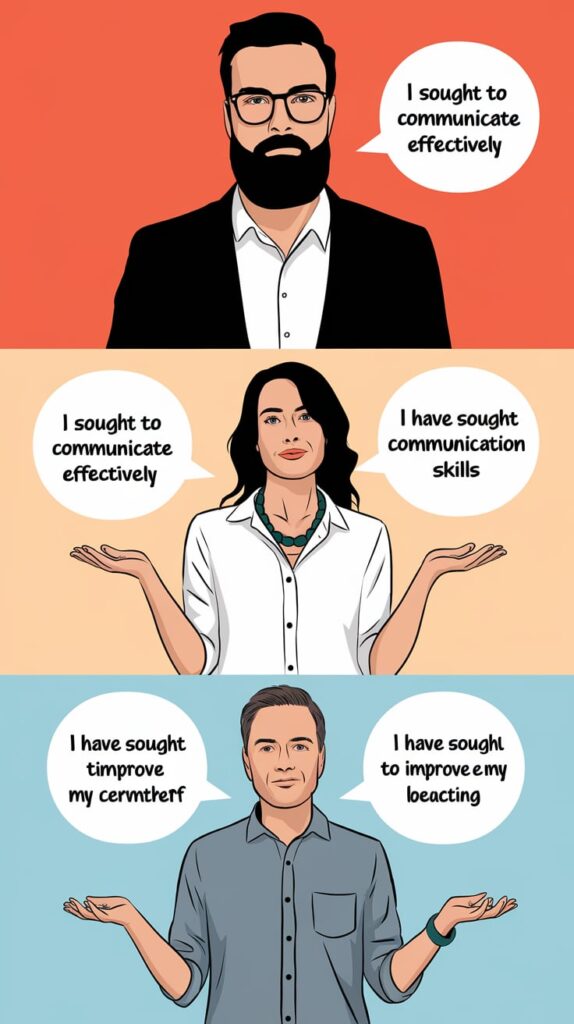Is the past tense of seek “seeked” or “sought”?
If you’ve ever hesitated while writing this verb, you’re not alone. Because most English verbs form the past tense by adding “-ed,” many people assume “seeked” is correct.
But English irregular verbs don’t follow simple rules.
The correct past tense of seek is sought and in this guide, we’ll explain exactly why.
You’ll learn:
• The correct past tense and past participle • Why “seeked” is incorrect • Clear sentence examples • How to avoid common grammar mistakes
Let’s make this verb simple once and for all.

read more : “WOAT” Definition, Origin, and Usage – Grammar Beacon
Is It Seeked or Sought? The Correct Past Tense
Definition and Explanation
To grasp the nuances of the verb “seek,” it’s important to define it clearly. “Seek” means to attempt to find, obtain, or achieve something. This action can apply to various contexts, from searching for information to pursuing personal goals.
When discussing the past tense of “seek,” the correct form is “sought.” This is a crucial distinction in English grammar, as using the wrong form can lead to misunderstandings and grammatical errors.
Correct Form: “Sought”
To illustrate the difference, let’s look at both forms in action:
- Present Tense: “I seek new opportunities every day.”
- Past Tense: “Last week, I sought new opportunities at the job fair.”
Using “sought” indicates that the action took place in the past, allowing for clear and effective communication.
The Past Participle of “Seek”
Understanding the past participle form of “seek” is equally important. The past participle is also “sought.” This form is commonly used in perfect tenses and passive constructions.
read more : Plural of Chief – Grammar Beacon
Usage in Sentences
Here are some examples that illustrate the use of the past participle:
- Present Perfect: “I have sought guidance from my mentors.”
- Passive Voice: “The answers were sought by many scholars.”
These examples demonstrate how “sought” is employed in different grammatical structures, further solidifying its role in the language.
Why “Seeked” Is Incorrect
One prevalent mistake is confusing “seek” and “sought” when writing or speaking. Remember that “sought” is exclusively the past tense and past participle of “seek.” Using these forms correctly can greatly enhance your grammatical accuracy.

Clarifying Confusions
It’s not uncommon for language learners to mix up verb forms, especially with irregular verbs like “seek.” Understanding the correct usage of “sought” is essential for improving your grammar skills.
In the Present: Seeking Wisdom
How “Seek” is Used Today
In modern language, “seek” appears frequently in conversations, literature, and various forms of media. It is often associated with a pursuit of knowledge, personal growth, or emotional fulfillment.
Examples of Current Usage
- In everyday conversation: “I seek balance in my life.”
- In professional contexts: “Our company seeks innovative solutions to industry challenges.”
These examples reflect how “seek” is relevant in both personal and professional scenarios, illustrating its versatility as a verb.
In the Past: The Quest of “Sought”
Historical Context of the Verb
Historically, “sought” has played a significant role in literature and oratory. The concept of seeking has been fundamental to storytelling, often portraying characters on quests for truth, love, or enlightenment.
Examples in Literature and Speech
Consider this example from literature: “She sought adventure in every corner of the world.” Such sentences emphasize the emotional and existential quests that are often depicted in storytelling.
Seek vs. Sought: Quick Comparison
Quick Comparison Chart
| Tense | Verb Form | Example Sentence |
| Present Tense | Seek | “They seek the truth every day.” |
| Past Tense | Sought | “They sought the truth during the investigation.” |
| Present Perfect | Have sought | “We have sought the best practices in our industry.” |
Summary of Key Differences
- “Seek” is used for actions occurring now or regularly.
- “Sought” indicates that the action happened in the past.
Understanding these distinctions is vital for effective communication and clarity in your writing.

When to Use Each Form
Guidelines for Usage
- Identify the time frame: Assess whether you are discussing a present or past action.
- Use “seek” for current actions: This applies when you are referring to ongoing searches or quests.
- Use “sought” for past actions: This indicates that the searching or pursuing occurred previously.
Contextual Examples
- Present Context: “I seek new ideas for my project.”
- Past Context: “Last month, I sought feedback from my colleagues on my presentation.”
These examples highlight how to properly use each form depending on the context.
Mastering the Verb Game
Tips for Remembering Verb Forms
- Practice in context: Create sentences using both “seek” and “sought.” Regular practice will reinforce your understanding.
- Visualize the action: Picture the act of searching. This mental imagery can help solidify your memory of the verb forms.
- Use flashcards: Write “seek” on one side and “sought” on the other, along with example sentences to enhance retention.
Exercises for Practice
- Fill in the blanks: Complete sentences using the correct verb form. For instance, “Yesterday, I __ (seek/sought) help from my friend.”
- Short stories: Write a brief narrative that incorporates both verb forms. This will help you see how they function in different contexts.
Wrapping Up the Time Talk
Final Thoughts on “Seek” and Its Forms
Understanding the differences between “seek” and “sought” is crucial for anyone aiming to master English grammar. By recognizing the contexts in which each form is used,
you can enhance your language skills and communicate more effectively.
Encouragement to Practice
As you delve into the complexities of English verbs, remember to practice regularly. The more you use “seek” and “sought” accurately, the more instinctive it will become.
Additional Scenarios and Examples
Everyday Situations
Let’s delve deeper into practical scenarios where you might use “seek” and “sought.”
At Work:
Present: “I seek to improve my skills through training.”
Past: “Last quarter, I sought additional training to enhance my performance.”
In Relationships:
Present: “We seek to strengthen our friendship by spending more time together.”
Past: “Last summer, we sought ways to reconnect after being apart.”
In Education:
Present: “Students seek knowledge from various sources.”
Past: “Last semester, I sought help from my professor for better understanding.”

Creative Writing
Using “seek” and “sought” in creative writing can enhance your storytelling. Here are examples:
In a short story:
“She sought the hidden treasure that legends spoke of, navigating through treacherous paths and ancient ruins.”
In Public Speaking
When delivering a speech, using “seek” and “sought” can add depth to your message. For instance:
- Present Usage: “Today, we seek solutions to global challenges.”
- Past Usage: “In previous generations, many sought freedom and justice.”
Is “Seek” an Irregular Verb?
Yes, “seek” is an irregular verb. Instead of adding “-ed,” it changes form completely in the past tense from “seek” to “sought.” Many common English verbs follow similar patterns, such as “teach” → “taught” and “think” → “thought.”
FAQ
What is the past tense of seek?
The past tense of seek is sought.
Is “seeked” a real word?
No. “Seeked” is grammatically incorrect in standard English.
What is the past participle of seek?
The past participle is also sought.
Is seek a regular or irregular verb?
Seek is an irregular verb because it does not form the past tense by adding “-ed.”
How do you use sought in a sentence?
Example: “She sought advice before making her decision.”
Conclusion
The correct past tense of seek is sought, not “seeked.”
Because seek is an irregular verb, it doesn’t follow the typical “-ed” pattern. Understanding this distinction strengthens your grammar and prevents one of the most common English mistakes.
Once you remember: Seek → Sought
You’ll never hesitate again.
Clear grammar builds confident communication.

James Logan is a seasoned blogger and language enthusiast behind Grammar Beacon. With years of experience in grammar and writing, James shares his expertise through insightful and engaging content. His passion for clear communication and linguistic precision shines in every post, making complex grammar concepts accessible and enjoyable for readers. Follow James for expert advice and tips to refine your writing skills.







